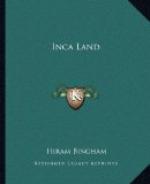As a citizen of Connecticut it gave me quite a start to see, carelessly exposed to the weather on the rough cobblestones of the plaza, bright new hardware from New Haven and New Britain—locks, keys, spring scales, bolts, screw eyes, hooks, and other “wooden nutmegs.”
At the tables of the “money-changers,” just outside of the sacred enclosure, are the real moneymakers, who give nothing for something. Thimble-riggers and three-card-monte-men do a brisk business and stand ready to fleece the guileless native or the unsuspecting foreigner. The operators may wear ragged ponchos and appear to be incapable of deep designs, but they know all the tricks of the trade! The most striking feature of the fair is the presence of various Aymara secret societies, whose members, wearing repulsive masks, are clad in the most extraordinary costumes which can be invented by primitive imaginations. Each society has its own uniform, made up of tinsels and figured satins, tin-foil, gold and silver leaf, gaudy textiles, magnificent epaulets bearing large golden stars on a background of silver decorated with glittering gems of colored glass; tinted “ostrich” plumes of many colors sticking straight up eighteen inches above the heads of their wearers, gaudy ribbons, beruffled bodices, puffed sleeves, and slashed trunks. Some of these strange costumes are actually reminiscent of the sixteenth century. The wearers are provided with flutes, whistles, cymbals, flageolets, snare drums, and rattles, or other noise-makers. The result is an indescribable hubbub; a garish human kaleidoscope, accompanied by fiendish clamor and unmusical noises which fairly outstrip a dozen jazz bands. It is bedlam let loose, a scene of wild uproar and confusion.
The members of one group were dressed to represent female angels, their heads tightly turbaned so as to bear the maximum number of tall, waving, variegated plumes. On their backs were gaudy wings resembling the butterflies of children’s pantomimes. Many wore colored goggles. They marched solemnly around the plaza, playing on bamboo flageolets, their plaintive tunes drowned in the din of big bass drums and blatant trumpets. In an eddy in the seething crowd was a placid-faced Aymara, bedecked in the most tawdry manner with gewgaws from Birmingham or Manchester, sedately playing a melancholy tune on a rustic syrinx or Pan’s pipe, charmingly made from little tubes of bamboo from eastern Bolivia.
At the close of the festival, on a Sunday afternoon, the costumes disappear and there occurs a bull-baiting. Strong temporary barriers are erected at the comers of the plaza; householders bar their doors. A riotous crowd, composed of hundreds of pleasure-seekers, well fortified with Dutch courage, gathers for the fray. All are ready to run helter-skelter in every direction should the bull take it into his head to charge toward them. It is not a bullfight. There are no picadors, armed with lances to prick




